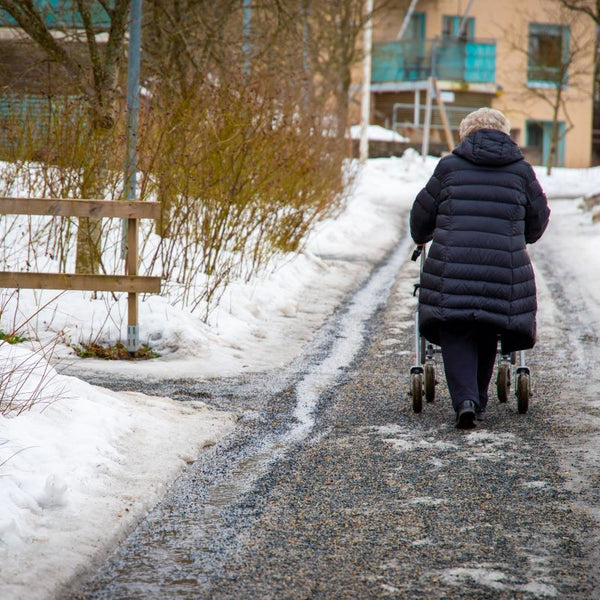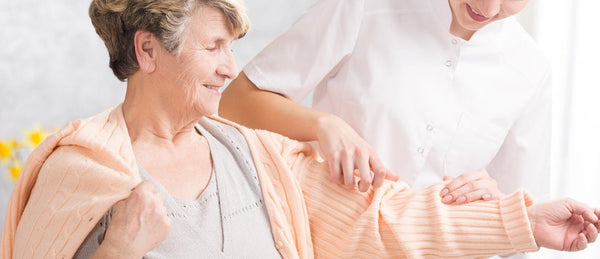For an older person who lives independently but may be concerned about potential falls or any other kind of incident at home, it might seem that having a mobile phone is a good option in case of emergency.
However, mobile phones do have drawbacks in these situations, and an alarm could be a more reliable and easier-to-use solution for raising an emergency alert for elderly people.
In this article, we look at which might be the best option for an older adult living independently so they are able to get help if needed.
Comparing your options
Mobile phones, and smartphones especially, have transformed personal communication, have lots of functionality and are always very handy to have close by in case of an emergency.
Personal alarms (or “care alarms”) are devices that traditionally have been designed for a single purpose: to notify someone if the emergency button is pressed.
Newer personal alarm models take advantage of GPS technology and other developments to include fall detection, GPS tracking and activity monitoring.
Here, we look at five key considerations when looking for a solution that ensures help is at hand if needed, and the peace of mind that this brings to older adults and their loved ones.
1. Ease-of-use in an emergency
It’s no secret that some older people can struggle to adapt to new technologies and find it very challenging to use some devices, including many mobile phone models.

Fiddly buttons and small screens are not designed with older people in mind.
Mobile devices usually take several steps to make a phone call. The person using the mobile phone may have to enter a pin code or password to unlock the device, get into the right application to make a call and look for who they want to call in their list of contacts.
For someone who has just experienced a fall, feels unwell, has been injured or has had another kind of accident, using a mobile phone in these circumstances can be a real challenge and may take several attempts if it’s even possible at all.

With a wearable alarm, the emergency button simply needs to be pressed once in order to access help, and some models come with elderly fall alerts that automatically raise an alarm when it senses the wearer has fallen.
This kind of straightforward process makes them very easy to use, without having to fiddle with complicated smartphone menus, touchscreens and scrolling through contacts.
2. Contacting people for help
If an elderly person has an incident when they are alone and require some help, they will need to alert someone so they can get this assistance.
Using a mobile phone, they may prefer to call a loved one or perhaps a carer, rather than the emergency services as the first point of contact, depending on what has happened.
But with a mobile phone, there are no guarantees that the person they are calling will be available or able to answer and deal with the situation. This could mean that there are delays in them getting the assistance that they need.
In comparison, the personal alarm service is monitored 24-hours a day, seven days a week. This means that even if the emergency alert comes in the middle of the night, there’s always someone there who can help and arrange whatever assistance is needed. A monitored fall alarm has many benefits over a mobile phone and even a fall alarm linked to mobile phone.
Out-and-About GPS Alarm
A good compromise is Taking Care's GO GPS Alarm. It is an easy-to-use location-aware alarm with a call button for the elderly you press to get help in an emergency.
The Emergency Resolution Team that answers alarm calls are trained for situations like this and can take steps to ensure that the help comes as quickly as possible. Taking Care's Emergency Resolution Team has experience in handling situations such as falls, fires, dementia-related incidents and intruders. They'll also have access to any relevant medical information that has been shared.

If you have a key safe then Taking Care can also give the key safe code to the emergency services so they can access your home without delay if you are unable to get to the door.
3. Portability and convenience
Mobile phones are portable by their very nature, being small, light and designed to be carried around. However, this can also mean that the phone is not necessarily always with the person that might need it if something happens.
Remembering to take their phone with them every time they get up and move to another room, for example, isn’t always a natural habit. It can mean that the person who needs it, may find their mobile phone isn’t in reach at the right time.
Whether it’s a pendant around the neck or on the wrist, like a watch, personal alarms are wearable – so they go wherever the person does.
This can also include in the bath or shower, with a waterproof alarm, which is really important because the bathroom is a common place for slips and falls. Most mobile phones are not suitable for this, and even water-resistant models often have lots of limitations. With wearable alarms, they don’t have to think about it or remember to take their alarm from room to room, it simply goes where they do all the time.
4. Keeping batteries charged
Mobile phones need to be charged regularly in order to have the battery power needed to make a call. This can mean that forgetting to charge the phone could have serious consequences if it’s the only way that an older person has to call for help in an emergency.
While some simpler, older phone models only need to be charged every week or so, most modern smartphones need charging daily.
Personal alarms are designed to be low maintenance and with some in-home alarm models, the pendant batteries can last up to six years without charging.

At Taking Care, we are notified if our in-home care alarm products need new batteries, and we arrange for them to be replaced free of charge.
5. GPS location features
Many modern smartphones have GPS technology, so they can send details of their location, which is a very handy feature. However, accessing this information to send in an emergency isn’t always that straightforward, and often requires a separate app to be used.
This could mean, if an older person is out of their home and needs some assistance, it might be quite tricky for them to send their exact location. If they are injured, or are unable to communicate verbally, it can be challenging for whoever they call to work out exactly where they are, if they are able to get through in the first place.
With a GPS tracker for seniors, the location is automatically sent when the alert button is pressed, so the Emergency Resolution Team know exactly where the alarm wearer is and can arrange whatever help is needed as quickly as possible.
Can you have a personal alarm linked to a mobile phone in the UK?
Whether you can have an alarm linked to a mobile phone is a common question. Some people would like the emergency button to call a family member's mobile number rather than being connected to a response service.
However, there are several potential drawbacks to this kind of setup, including:
- The person with the nominated phone might not be available to answer or may be asleep if the alert is raised at night.
- The person with the nominated phone may have it switched off, the battery might not be charged, or they may not have any service from their provider.
- If the person with the nominated phone is reached by the alarm, they will need to make important decisions about whether any further help is needed. This is a responsibility they may not be trained for or feel comfortable handling on their own.
- If the elderly person is unable to speak when connected to the nominated person, the call recipient might not know what the best course of action is.
- The nominated mobile number could be out-of-date if someone forgets to update their details when they change numbers, so potentially no one could be alerted by the alarm at all.
The benefits of using an alarm that will automatically alert a professionally trained team include:
- 24/7 monitoring of the alarm, 365 days a year, so that there is always someone there at any time of the day or night to take any action to help that is needed.
- The Emergency Resolution Team is fully trained to handle emergency situations and know exactly who to contact, whether that’s family members, the emergency services, carers or all of the above, in the given circumstances.
- They will have access to any medical information shared, as well as the key safe code if there is one, so the most appropriate response can be arranged as quickly as possible.
The Taking Care range of alarms have a variety of different features to ensure that there’s an option that suits almost all circumstances and lifestyles, and helps older people to live independently for longer. See the full range of Taking Care personal alarm products.
Browse personal alarms
Compare features from some of the best personal alarms in the UK and find the one that's most suited to you or your loved ones




